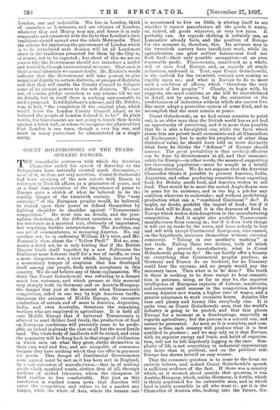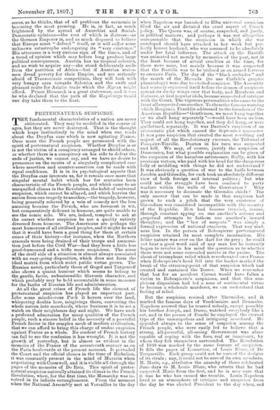COUNT GOLUCHOWSKI ON THE TRANS- OCEANIC DANGER. T HE remarkable sentences
with which the Austrian Chancellor ended his speech of Saturday to the Delegations have naturally created much discussion,— most of it, we fear, not very nutritive. Count Goluchowski had been speaking of the new entente with Russia in reference to Turkish affairs as a guarantee of peace, and as a final demonstration of the importance of peace to Europe gave a sketch of what he believed to be the coming danger of the twentieth century. The "very existence" of the European peoples would, he believed, be staked upon their power to defend themselves by fighting shoulder to shoulder against "Transoceanic competition." He went into no details, and the jour- nalists, therefore, of the different countries are treating his utterance as a mystical text, obviously of importance, but requiring further interpretation. The Austrian, say one set of commentators, is menacing America. No, say another set, he is endorsing William IL's view, and Mr. Pearson's view, about the "Yellow Peril." Not so, com- ments a third set, he is only hinting that if the British Empire binds itself together by a new Zollverein the Continent must federate itself for a war of tariffs, or even a more dangerous war, a view which, being favoured by a momentary temper of suspicion that has developed itself among our people, finds much acceptance in this country. We do not believe any of these explanations. We think that Count Goluchowski was referring to a danger much less visionary, and which presses at this moment very sharply both on Germany and on Austria-Hungary, the danger that just at the moment when Transoceanic competition, aided in one way by high American tariffs, threatens the artisans of Middle Europe, the excessive production of cereals and of meat in America, Argentina, India, and even Australia, threatens the remaining workers who are employed in agriculture. It is held all over Middle Europe that if universal Transoceania is allowed to send thither food freely, the production of food on European conditions will presently cease to be profit- able, as indeed is already the case on all but the most fertile land. The whole body of landlords will be ruined, and even the peasantry will be flung back to that stage of civilisation in which men eat what they grow, clothe themselves in their own wool and flax, and are incapable of commerce because they have nothing which they can offer in payment for goods. This danger all Continental Governments seem agreed must be met as it has been met in England, by a vast extension of manufactures,—that is, of making goods which mankind wants, clothes first of all, through millions of skilled labourers, whom the cheapness of food enables to live comfortably. But just as this conclusion is reached comes news that America will enter the competition and refuse to be a market any longer, while the whole of Asia, where the human race is accustomed to live on little, is stirring itself to see whether it cannot manufacture all the goods it wants, or, indeed, all goods whatever, at very low rates. It probably can. As regards clothing it certainly can, as Lancashire already feels, and the position of Europe for the moment is, therefore, this. Its artisans may in the twentieth century have insufficient work, while its agriculturists can grow neither farinaceous food nor flesh food—their only possible occupation—at an even reasonable profit. Transoceania, considered as a whole, will at once feed Europe, and, as regards all staple industries, undersell it. That, says Count Goluchowski, is the outlook for the twentieth century now coming so rapidly upon us ; and what is Europe to do to meet such a condition of affairs, which "threatens the very existence of her peoples " ? Clearly, to begin with, he suggests, she must combine, or she will be overwhelmed in detail, not by armies, but by the extinction or the profitlessness of industries without which she cannot live. She must adopt a protective system of some kind, and to accomplish that she must remain at peace.
Count Goluchowski, as we had recent occasion to point out, is an abler man than the British world has as yet had an opportunity of perceiving, and it is more than possible that he is also a far-sighted one, while the facts which alarm him are patent to all economists and all Chancellors of Exchequers ; but to make his prophecy of other than rhetorical value, he should have told us more distinctly what form he thinks the " defence " of Europe should assume. The great probability is that nothing effective can be done by Governments at all, and that economic safety for Europe—in other words, the means of supporting her increasing population—must be sought in a totally different direction. We do not suppose that the Austrian Chancellor thinks it possible to prevent America, India, Argentina, and other producing countries from exporting food, for Britain needs food, and America wishes to sell food. That would be to meet the united Anglo-Saxon race in arms for its existence, and is too big a job for any coalition whatever to undertake; and without prohibiting production what can a "combined Continent" do ? It might, no doubt, prohibit the import of food ; but if it does food will be dear, and it is the dearness of food in Europe which makes Asia dangerous in the manufacturing competition. And it might also prohibit Transoceanic manufactures from coming in; but if it does both things it will cut up trade by the roots, and have nobody to buy and sell with except Continental Europeans, who cannot, on the hypothesis, maintain themselves without external commerce. "Taking in one another's washing" is not trade. Failing these two devices, both of which have so far proved unsatisfactory, what is Count Goluchowski going to do ? He can hardly offer a bounty on everything that Continental peoples produce, as Germany and France do on beetroot, for no Treasury could bear the expense, and no people would pay the necessary taxes. Then what is to be done ? The truth is there is nothing to be done except to bear competi- tion in patience, using, so far as may be, the superior intelligence of European captains of Labour, machinists, and inventors until success in the competition develops among Asiatics new wants, a higher rate of wages, and a greater reluctance to work excessive hours. Asiatics like ease and plenty and luxury like everybody else. It is quite true, as Count Goluchowski sees, that the world's industry is going to be pooled, and that this places Europe for a moment at a disadvantage, especially as regards agriculture; but the process is a natural one, and cannot be prevented. As soon as it is complete, and com- merce is free, each country will produce what it is best qualified to produce ; and. we may rely on it that Europe, with its superior energy and brain, and habit of organisa- tion, will not be left hopelessly lagging in the race.. Sim- plicity of life is not everything in industrial organisation any more than in political, and on the political side Europe has shown herself an easy winner.
That the economic question is to come to the front we entirely believe, and indeed Count Goluchowki's speech is sufficient evidence of the fact. If there was a country which, as it seemed, stood outside that question, it was Austria-Hungary, which, unlike Germany, is fertile, which is thinly populated for its culturable area, and in which land is easily accessible to all who want it; yet it is the Chancellor of Austria who, looking into the future, dis- cerns, as he thinks, that of all problems the economic is becoming the most pressing. He is, in fact, as much frightened by the spread of Anarchist and Social- Democratic opinions—the root of which is distress—as the German Emperor is, and as much disposed to believe that Europe must " defend " itself, or it will suffer some unknown catastrophe endangering its "very existence." His utterance is a very curious sign of the times, and of a trend of opinion which may before long produce large political consequences. Austria has no tropical colonies, and no wish to acquire any—she stood deliberately aside from the partition of Africa—but if Austrian states- men dread poverty for their Empire, and are seriously afraid of Transoceanic competition, they will look with very hungry eyes towards Salonica and the swift and pleasant route for Asiatic trade which the Egean might afford. Prince Bisinarck is a great statesman, and it was he who declared that the path of the Hapsburgs would one day take them to the East.







































 Previous page
Previous page